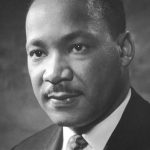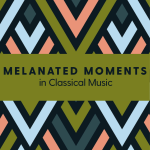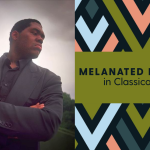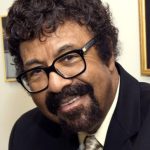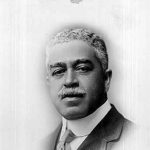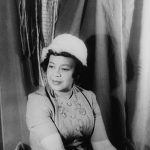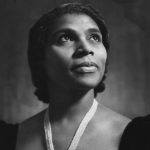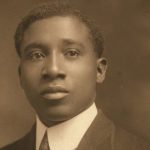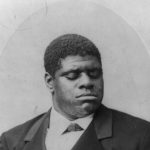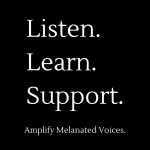Melanated Moments, S2E4: The Spirituals Guru – Moses Hogan
Angela and Joshua discuss the short but immensely impactful life of Moses Hogan and his contributions to music by making spirituals a standard part of choral repertoires.
Featured Music:
“Elijah Rock,” arranged by Moses Hogan
“Joshua Fit the Battle of Jericho,” arranged by Moses Hogan
“I’m Gonna Sing ‘Til the Spirit Moves in My Heart,” arranged by Moses Hogan
Music Plays (00:00): [MMCM Theme] Angela Brown (00:15): Hey, y’all. Welcome back to Melanated Moments in Classical Music. I’m Angela Brown… Joshua Thompson (00:22): And I’m Joshua Thompson! Angela, as always. It’s good to see you, good to be with ya. I already know you are really excited about what you offerin’ the people to feast their ears on today. What’s on the menu? Cook the recipe. What we doin’? Angela Brown (00:38): [Laughter] Well, Joshua today I have a little bit of soprano, a touch of alto, a dash of tenor and a pinch of bass. Then I let it simmer a while, you know, so then the melodies can melt together and make a delicious, harmonious stew. Then I add a soloist and a well accomplished conductor and stir… And voila! You have a fabulous chorus and conductor from the Bayou country. I’m talking N’awlins baby, or to some New Orleans, Louisiana. Joshua Thompson (01:19): See, here you go, talking about musical shrimp and grits and educated étouffées, and I’m hungry! But I’m also intrigued. So please let us know: who are you talking about today sister-friend? Angela Brown (01:30): I’m talking about the one and only Moses Hogan. Joshua Thompson (01:35): Yes. Yes. Tell us a little bit about him. Angela Brown (01:38): Yes, Moses George Hogan was an American composer and arranger of choral music. He was best known for his settings of spirituals. Hogan was a pianist, conductor and arranger of international renown. He is known for single handedly– I said, single-handedly– introducing spirituals into the standard choral repertoire. Joshua Thompson (02:08): I– I did not know that. As far as I knew, he wrote them, but I didn’t know he was the one– he’s the reason why we all care so much, even more about spirituals in choral repertoire. So I’m sure we’ll circle back to that. Let me let you finish your recipe. You still bakin’, you still cooking. What you do– Angela Brown (02:24): Well, he didn’t write the spirituals. He arranged the spirituals because there are no more spirituals being written. But honey, they have been arranged. Joshua Thompson (02:31): Okay. Angela Brown (02:32): Anyway, let me continue. Joshua Thompson (02:33): Yes. Angela Brown (02:33): Born March 13th, 1957 in New Orleans, Louisiana, Hogan lived with five siblings and his parents, who gave their children a passion for music. He was an accomplished pianist at the age of nine, and Hogan was musically educated from a young age, first enrolling in Xavier University Junior School of Music. And in his sophomore year of high school, he was accepted to New Orleans’ Center for Creative Arts High School and was in its first graduating class of 1975. From- after graduating from high school, Hogan was awarded a full scholarship to Oberlin Conservatory of Music– Joshua Thompson (03:21): Wow! Angela Brown (03:21): — Where he studied piano and graduated in 1979 with a Bachelor of Music Degree. So, immediately after graduating, he began graduate studies at Juilliard School of Music, which he did not complete. Joshua Thompson (03:40): Why is that, right? I don’t know. First of all, if I’m getting a full ride to Oberlin– first of all, I tried and I didn’t, uh– and then I go to Juilliard…You know, what is it? These are premier institutions. How come he doesn’t finish the degree? Angela Brown (03:51): Well, if you ask me, as I continue to tell you more about his story, I think he just had more to offer than sitting in a room and pontificating and working out Aeolian modes where he needed to be writing and doing and producing, but let me finish his story. Joshua Thompson (04:10): Okay. Angela Brown (04:10): So after he went to Juilliard and didn’t finish his degree, he went to Vienna and started studying classical music. He then returned to Louisiana State University, where he was offered the opportunity to work for his doctorate, but he also decided not to pursue it. There’s a reason. There’s a reason, hold with me. In 1980, he formed The New World Ensemble and began arranging choral music. Uh, in 1993, he founded the Moses Hogan Chorale and the following year, he published his arrangement, Elijah Rock, which is one of his most famous arrangements. And, like I said, I believe that Moses just… He had a lot to do in a short time. So let’s listen to Elijah Rock. Joshua Thompson (05:07): Yes, let’s, and then we’ll come back and discuss! Music Plays (05:09): [Moses Hogan, “Elijah Rock”] Joshua Thompson (08:32): I knew it! I knew that was you, Angela, livin’ up there in those rafters! Such a fun piece, but let me back up real quick and let you kind of interpret for us. Angela Brown (08:43): Well, you know, Moses’s pieces, you could hear his influences of classical music, of the spiritual and– digging deep– a little gospel on the edge, but he never let– he always kept it very much in the classical vein. But before we get any deeper into talkin’ about the music, let me just go ahead and finish off his bio. Joshua Thompson (09:08): Do that. ‘Cause there’s a lot [laughter]. Angela Brown (09:11): Actually, the problem is there isn’t a lot, because in 1997 he founded the Moses Hogan Singers. Uh, and their first album was released in 2002, and on November 20th, 1999, Hogan was honored with his own day known as Negro Spiritual Moses Hogan Chorale Day. Moses Hogan died February 11th, 2003 at the age of 45 from a brain tumor. Joshua Thompson (09:41): That’s just– Just, wow. Right? Cause it’s– here’s, such a short life, but packing so much into it, making it such an important one. And just thinking that– in that short amount of time, single handedly making the spiritual a part of the regular landscape of choral singing. So I find that to be remarkable, but I do know, whether the listeners know or not, you and Moses had a working, professional, and even friendly relationship, which I think is special ’cause you knew him. You created with him. So can you tell us how that started and what that relationship– working relationship was like between you and Moses Hogan? Angela Brown (10:22): Well, yes, Moses and I were working partners, and he was my mentor. He was a great influence on my musical life. And I think one of the reasons– you asked earlier as I was reading his bio– you asked, well, why would he not finish Juilliard after having a full ride to Oberlin and not work on having the opportunity to work on his doctorate in Louisiana State? Because I think innately, he knew his time was short. He was only 45 when he passed. But the canon of music that he has left for all of us to enjoy is vast. So– but I met Moses in 1993 at the ACDA convention in Knoxville, Tennessee, and Maestro Leo Davis introduced us and Moses hired me to sing solos with his group, the Moses Hogan Chorale. And I became a regular soloist and sang with him, either with a group or totally solo when he would go out by himself and work with other choirs in workshops and conventions and things. And so he would have me as a soloist to come and work with the choir. And he taught me the real difference between gospels and spirituals. He would tell me often, “Angela, if the arranger had wanted a high D at the end of a particular song, he would have written it in. Girl, sing what’s on the page!’. Unison (11:52): [Laughter] Angela Brown (11:52): And– Joshua Thompson (11:54): What’d he say, he say- we say: stick to the script and read it, like we wrote it! [Laughter] Angela Brown (12:02): Exactly! Because the composer was hearing it as he was writing it. So especially if he is alive! Joshua Thompson (12:09): Yeah. That’s fair. I think that, that’s very fair. Right? Do we not tend to over-interpret or– he’s like, ‘yo, don’t do that. That’s why I’m here’. I think that’s. Yeah. Unison (12:16): [Laughter] Angela Brown (12:18): Exactly! And so, uh, I respected him for that. There was another well-known spiritual that he had entitled The Battle of Jericho. Let’s listen to that one… Music Plays (12:32): [Moses Hogan, “The Battle of Jericho”] Joshua Thompson (14:45): Yeah! So I have heard this several times, not just his arrangement. This is one of those tunes, uh– Growing up as little kid in church, you sang this, right? We sang this all the time. Um– I’m a fan of the subject matters, as in Joshua! Angela Brown (14:57): [Laughter] Joshua Thompson (14:57): But I’m really familiar with the arrangement, but I think this is what makes it so fun, moving to listen to, is: it doesn’t matter how many times you’ve heard it, you love to hear it again. And Moses Hogan just does incredible things. He puts the high D at the very top, only where it’s supposed to be and that adds so much gravitas to the end of it. Right? Angela Brown (15:22): It was the horn that brought the walls of Jericho down! Because the Bible story is: they had the Hebrews walk around the city of Jericho seven times for– I think it was seven times for seven days. And then on the last time they blew the horn and the walls came tumbling down. So that’s why you hear that, that high note at the end there. Joshua Thompson (15:50): And thank you for bringing up the seven and seven, right? Because I think a lot of times people be like, ‘Oh, it’s repeating. There’s, you know, we’ve heard this line before’. It’s like seven being a symbolic number. So obviously Moses Hogan, being very in tune with this, right, it’s more than just listening, singing, and playing the music. And it’s fun to listen to it that way. So thank you for this. Angela Brown (16:11): He was word painting because you can actually hear them marching around the city at the– ‘specially at the beginning: Joshua, Joshua– you know, it was like–[sings] ‘Joshua fought the battle of’– each part built on each other and they were marching around that city and he was just word painting and telling that story. I love battle of Jericho! Joshua Thompson (16:33): He does it so well. Angela Brown (16:36): He does! He really did help me to respect what the composers wanted. And he also had a very high standard for everything and everyone around him. Joshua Thompson (16:47): I– imagine that! Angela Brown (16:48): Oh yes, baby! One of the things, Joshua, that he told me one day– we were traveling back from a concert at the University of Indi– I guess it was Indiana University of Indiana, Pennsylvania. Joshua Thompson (17:02): Okay. Angela Brown (17:02): And we were driving back to the airport and he said to me– I was evidently dating somebody that he didn’t care for. And he said to me, ‘never deal with anyone who won’t lose as much as you will by dealing with them. In other words, baby, if you lay down with dogs, you just might get fleas’. [Laughter] Joshua Thompson (17:27): Listen, And when I tell you- [Laughter]. Angela Brown (17:27): I head that advice to this day! Angela Brown (17:31): And I could– that is sage advice. Write that down somewhere! Angela Brown (17:36): You know what? I’ll text it to you! But we still have one more song that we’re going to listen to before we’re done today. It’s called, ‘I’m Gonna Sing til the Spirit Moves in my Heart’. Music Plays (17:57): [Moses Hogan, “I’m Gonna Sing til the Spirit Moves in my Heart”] Joshua Thompson (19:52): Angela, I love it! And that was finger lickin’ good! You know I don’t sing, and you got me over here doin’ it. So you see how I did that? [Laughter]. Angela Brown (20:00): Oh my goodness… Yes! Joshua Thompson (20:00): [Laughter] Talkin’ about the choir and then the music and the N’awlins, and it’s bein’ this big, ol’ thing of stew. And I was hungry, and I was inspired! So I just had to sing about it. Is that okay, I’ll leave the rest of it to you. But I just had to let people know. Unison (20:14): [Laughter] Joshua Thompson (20:14): I just, I really love this. You know, Angela, this is yet another time– cause you and I have discussed spirituals, typically, are not my wheelhouse and are not my go-to, but you– man, you are slowly but surely– not slowly, you are surely changing that for me. And it’s just fun. So I seriously would just want to thank you for bringing someone to us who is so rich with musical talent has so much love for this elevation of the Negro spiritual. What I always think is awesome is, uh, his spirit of mentorship that is still living because you pass that on to other people. You’re a mentor to me, right? So this whole thing, um, I just think it’s wonderful. So we certainly owe Moses Hogan a great debt of gratitude for bringing the spiritual to the forefront– Angela Brown (21:12): Yes. Joshua Thompson (21:12): And all these other beautiful arrangements that we can hear, and we will. But for now I’m Joshua Thompson… Angela Brown (21:19): And I’m Angela Brown. Unison (21:21): And this has been Melanated Moments in Classical Music. Joshua Thompson (21:26): Season Two of Melanated Moments in Classical Music was made possible by the Indianapolis Foundation, a CICF affiliate. We thank them for their generous support. Angela Brown (21:40): Melanated Moments in Classical Music is proud to partner with the Coalition for African-Americans in the Performing Arts and Morning Brown Incorporated. Joshua Thompson (21:51): Melanated Moments in Classical Music is a production of Classical Music Indy. Our producer is Ezra Bakker Trupiano. Our theme music was composed by Laura Karpman. Music Plays (22:02): [MMCM Theme]
[/su_tab] [su_tab title=”Related Blog Posts” disabled=”no” anchor=”” url=”” target=”blank” class=””]LOCAL CLASSICAL – MELANATED MOMENTS SEASON SIX
As we continue celebrating Black Music Month, this week’s playlist will feature music and artists discussed during the latest season of Melanated Moments in Classical Music. All of season six was recently released and featured vibrant discussions about artists such as Scott Joplin, Hazel Scott, Joseph Bologne, and Kenneth Overton, among others.
LOCAL CLASSICAL – BLACK MUSIC MONTH
In this week’s playlist, we celebrate Black Music Month which takes place in June. It was created by President Jimmy Carter in 1979 to honor and celebrate Black artists’ contributions to music. We’ll be honoring the late Herman Whitfield III, an Indianapolis native who was a gifted pianist and composer. We’ll also hear performances of artists who have been featured in season four of Classical Music Indy’s podcast, Melanated Moments in Classical Music.
LOCAL CLASSICAL – MELANATED MOMENTS
In this week’s Black History Month playlist, we bring you recordings by composers, performers, and artists who have been highlighted in our podcast, Melanated Moments in Classical Music. Melanated Moments is the ward-winning podcast from Classical Music Indy that shines a spotlight on musical works composed by, for, and about Black people.
LOCAL CLASSICAL – HOST OKARA IMANI
Hey, Starshine! This is Okara Imani, Media Production Fellow for Classical Music Indy, and your guide to The “I” in Classical Music. I’m here to highlight the cultural and social intersections of the classical art form, beyond the Classical Period and beyond the constructs of Euro-centric high society origins.
Ric’key Pageot: Inspiring a Moment to Learn, Acknowledge, and Respect
Ric’key Pageot: Inspiring a Mo …
Ignatius Sancho: Composing the Hypocrisy of Colonialism & Convention
Ignatius Sancho: Composing the …
NEW CLASSICAL – DR. BILL BANFIELD
This week we bring you the music of Dr. Bill Banfield. Dr. Banfield is an award-winning composer whose symphonies, operas, chamber works have been performed and recorded by major symphonies across the country. Few have a wider, performed professional composing output, that has had public concert performances, reviews, radio, recordings of some 12 symphonies, 7 opera, 9 concerti, chamber, jazz, and popular forms. This alone making Dr. Banfield one of the most performed, recorded composers of his generation. In 2010 and 2016, Dr. Banfield served as a Pulitzer Prize judge in American music.
#AmplifyMelanatedVoices
Classical Music Indy stands with our Black community. We are here to listen, learn, and lend our support. We believe that classical music is powerful; that it evokes a range of human emotions and creative expression.
Angela Brown Brings her Unbridled Zeal to a New Podcast.
Angela Brown brings her unbrid …


